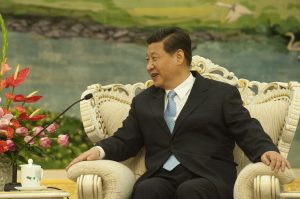For someone with such honorable credentials in Chinese Communist Party history, Xi Jinping has spent decades behaving modestly. The son of Xi Zhongxun – a CCP historical figure who not only played an important role in protecting Mao Zedong during the Long March but also provided essential leadership for the success of economic reforms promoted by Deng Xiaoping in Guangdong – the now Chinese national leader was seen both domestically and externally as a politician who prospered through silence, diligence, and humility.
Even in 2012, on the cusp of being crowned successor to Hu Jintao, Xi was the antithesis of Bo Xilai, who came closest to challenging his claim to the post of paramount leader. Xi was known as a meticulous technocrat shaped by the brutality of the Cultural Revolution, while Bo splurged on promoting his own cult of personality, irritating parts of the CCP. Bo would fall from grace after participating in a murder that shocked the world and shook the party, leaving a clear path for what the West saw as a reformer.
Ten years later, as he works to secure a controversial third term, even the most moderate voices outside of China agree that Xi in 2022 bears little resemblance to the image the Western political elite held of him.
Despite earlier misjudgments by Europeans and Americans, Xi brought credible reasons for optimism. China was slowly but steadily moving toward a path of economic and political liberalization, and the country expected vertiginous growth. On a personal level, Xi shared candid memories of the United States, which he had visited for the first time as a young official in 1985 and then on four other occasions (1992, 1993, 2006, and 2012) before becoming CCP general secretary.
However, while Washington hoped that political and trade relations between the Americans and the Chinese would put Beijing on the path to political liberalization, Xi was focused instead on difficult situation at home when he took office. Wealth brought endemic corruption in all branches of the party, weakened central power, and fostered various groups of influence in the CCP.
If Xi wanted to re-establish unity and not go down in history as a relatively weak leader, he would need to purge the CCP of corrupt cadres, who were sabotaging its legitimacy and centrality in Chinese political life. This is precisely what Xi promised to do when sworn in and he followed through in the following years, initially gaining new enemies but later using the very popularity of his anti-corruption measures to crush opponents and ensure the establishment of a party hierarchy that was organized around him.
Amid his devotion to the task, Xi’s first two terms will be marked by a slowdown in economic reforms, widely acknowledged as essential for continued growth. Within the CCP, at the beginning of Xi’s first term, there were those who considered the strengthening of market forces the ruin of socialism advocated by the classic texts of Marx and Mao. Others, representing the interests of state-owned enterprises (SOEs) already severely impacted by liberalist measures, worked to secure market share even at the cost of efficiency and productivity.
In choosing between political legitimacy and openness, seeing that increasingly one necessarily led to the other, Xi made a conscious choice: he protected the CCP.
At this point, there is little doubt among domestic and international observers that Xi will be able to be reappointed as China’s leader, perhaps the most important and influential since Mao himself. This is not a surprise, especially after Xi, while being re-elected CCP general secretary in 2017, didn’t appoint an heir. A few months later, in early 2018, he managed to eliminate the term limits for the president in the Chinese Constitution while simultaneously enshrining his own “thought on socialism with Chinese characteristics for a new era” in the national charter.
While Xi’s leadership is not in doubt, the 20th National Congress of the CCP will be a good barometer for questions that, for months (if not years), have circled the discussion of several China watchers: What is China’s exit strategy for a post-COVID era? How do ambitions such as the Belt and Road Initiative and “common prosperity” policies fare in the face of a domestic contracting economy and significant long-term challenges, such as the housing crisis and the reversal trends in the demographic pyramid?
Chinese history also shows that power vacuums and echo chambers pose the most pressing risks to political stability and territorial unity. How long will Xi be able to rule without indicating who will be his heir? And once he taps a successor, how can he avoid becoming a lame duck at a time when he hopes to consolidate his legacy?
The questions are many, but the answers, so far, are few. Those chosen to fill positions on the Politburo and its Standing Committee – whether more or less aligned with Xi — will give a dimension of how tight his control over the party will be and, by extension, what the next chapter of China’s relations with the rest of an increasingly hostile and chaotic world will be like.
It’s safe to say that next Sunday, the West will wait apprehensively to see which Xi Jinping crosses the Great Hall of the People to rule the country for another five years. In a chaotic world that struggles to end the pandemic while worrying about the large-scale invasion of Ukraine and the disastrous effects of climate change, signs thus far indicate that Xi will not be willing to put ideological and geopolitical contentions aside in favor of the pragmatism that has served the Chinese economy so well over the past 40 years.

































